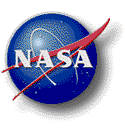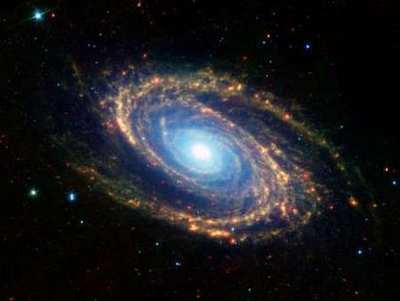Fri, Dec 19, 2003
Spitzer IR Telescope "Open For Business"
 NASA has renamed the Space Infrared
Telescope Facility, its newest space observatory, for the late
astronomer Dr. Lyman Spitzer, Jr. The official name is now the
Spitzer Space Telescope. The Spitzer Space Telescope program is
managed by the Jet Propulsion Laboratory (JPL) for NASA's Office of
Space Science in Washington D.C. Science operations are conducted
at the Spitzer Science Center at the California Institute of
Technology in Pasadena. In concert with the renaming, NASA also
released the first scientific images from the Spitzer
telescope.
NASA has renamed the Space Infrared
Telescope Facility, its newest space observatory, for the late
astronomer Dr. Lyman Spitzer, Jr. The official name is now the
Spitzer Space Telescope. The Spitzer Space Telescope program is
managed by the Jet Propulsion Laboratory (JPL) for NASA's Office of
Space Science in Washington D.C. Science operations are conducted
at the Spitzer Science Center at the California Institute of
Technology in Pasadena. In concert with the renaming, NASA also
released the first scientific images from the Spitzer
telescope.
The telescope is now online and has already sent back incredible
pictures of the great beyond.
The Spitzer telescope was built, integrated and tested at
Lockheed Martin Space Systems Company facilities in Sunnyvale,
California, and was launched on Aug. 25, 2003 from the NASA Kennedy
Space Center in Florida. Space Systems is also providing mission
support for Spitzer spaceflight operations in conjunction with the
Jet Propulsion Laboratory (JPL) and the California Institute of
Technology.

Lyman Spitzer, Jr. (1914-1997) was one of the twentieth
century's most renowned scientists, and the first to advance the
idea of placing a large telescope in space. After pointing out, in
1946, that a space-based telescope would avoid the blurring effects
of Earth's atmosphere, Spitzer devoted the next 50 years of his
career to making this vision a reality. His determined efforts led
to two successful NASA space telescopes: the Copernicus satellite
and the Hubble Space Telescope. He also made significant
contributions to the fields of stellar dynamics, the interstellar
medium and plasma physics.
"Lyman Spitzer was a personal friend and a great inspiration to
me. We congratulate Dr. Spitzer's family on this distinct honor,
and applaud NASA on the perfect choice in naming its fourth Great
Observatory," said Jim Crocker, vice president, Civil Space at
Lockheed Martin Space Systems. "In addition, the images released
today from the Spitzer Space Telescope are breathtaking, and we
look forward to the many important discoveries to come from this
new window on the universe."
More News
Also: B-29 Superfortress Reunion, FAA Wants Controllers, Spirit Airlines Pulls Back, Gogo Galileo Van's Aircraft posted a short video recapping the goings-on around their reorganiz>[...]
Light Gun A handheld directional light signaling device which emits a brilliant narrow beam of white, green, or red light as selected by the tower controller. The color and type of>[...]
"The journey to this achievement started nearly a decade ago when a freshly commissioned Gentry, driven by a fascination with new technologies and a desire to contribute significan>[...]
"Our driven and innovative team of military and civilian Airmen delivers combat power daily, ensuring our nation is ready today and tomorrow." Source: General Duke Richardson, AFMC>[...]
Aircraft Conflict Predicted conflict, within EDST of two aircraft, or between aircraft and airspace. A Red alert is used for conflicts when the predicted minimum separation is 5 na>[...]
 Airborne 04.16.24: RV Update, Affordable Flying Expo, Diamond Lil
Airborne 04.16.24: RV Update, Affordable Flying Expo, Diamond Lil ANN's Daily Aero-Term (04.20.24): Light Gun
ANN's Daily Aero-Term (04.20.24): Light Gun Aero-News: Quote of the Day (04.20.24)
Aero-News: Quote of the Day (04.20.24) Aero-News: Quote of the Day (04.21.24)
Aero-News: Quote of the Day (04.21.24) ANN's Daily Aero-Term (04.21.24): Aircraft Conflict
ANN's Daily Aero-Term (04.21.24): Aircraft Conflict




